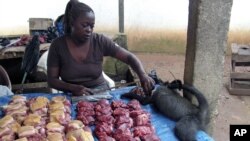DAKAR - Liberia's forestry authority said poachers have overrun the country's national parks and are killing elephants, chimpanzees and other protected species for sale on the bushmeat market.
Liberia's Gola forest preserve is part of a vast rainforest that once stretched across this part of West Africa but now covers just patches of Liberia and neighboring countries.
The head of conservation at the government Forest Development Authority (FDA), Theo Freeman, said poachers are now threatening the existence of several rare animal species living in the Gola and Sarpo national parks. "There are people who have decided to just get in the forest and hunt everything they come across," he said.
"The hunting also goes on for those species that are fully protected like the leopards, the pygmy hippopotamus, the elephant, the crocodile, jentik duikers, and what have you," Freeman said. "We had about seven species of monkey. They are killing everything."
Freeman said hunters sell the animals as bushmeat, which is often exported to neighboring Sierra Leone and Ivory Coast, despite a ban on the cross-border sale of wild animals. "Where we are now is highly commercial. You see truckloads of dried meat, bushmeat endangered or not endangered, coming from rural areas to town," he added.
Freeman said snaring and wire traps are the methods of choice. He said gunfire draws too much attention.
"A single man in a village who have about 200 or 300 [traps], he sets these things and he won't have a chance to visit the traps throughout the day, or sometimes two or three weeks," Freeman said. "We go on the back roads and we see these things and the animals are dead. You see the bones. Some are getting rotten. It is a very cruel way to hunt."
Rural communities have traditionally hunted and eaten wild animals. However conservationists have long condemned the commercial bushmeat trade as one of the primary threats to African wildlife. Still, the trade continues to thrive in West and Central Africa, in part due to poverty.
Liberian hunter Ben Varney said he cannot find any other way to support his five children. "No job in the country. I need to kill these animals to feed my family," he said.
"If the government provides job, we will leave the forest. But for now, this is the only place we depend on to supply our needs," Varney added. "I kill the animals, sell them, to send my children to school and feed my family."
In Liberia, it is illegal to kill protected species like chimpanzees and elephants. However, current laws are weak and vague, making prosecution difficult. Forest rangers are not allowed to carry guns and it is difficult for them to patrol such large expanses of territory.
Freeman said the FDA drafted a revised law that would strengthen punishments for illegal hunting. However the legislation continues to languish in the president's office.
Meanwhile, he said the hunting continues to push endangered species closer to extinction.
Liberia's Gola forest preserve is part of a vast rainforest that once stretched across this part of West Africa but now covers just patches of Liberia and neighboring countries.
The head of conservation at the government Forest Development Authority (FDA), Theo Freeman, said poachers are now threatening the existence of several rare animal species living in the Gola and Sarpo national parks. "There are people who have decided to just get in the forest and hunt everything they come across," he said.
"The hunting also goes on for those species that are fully protected like the leopards, the pygmy hippopotamus, the elephant, the crocodile, jentik duikers, and what have you," Freeman said. "We had about seven species of monkey. They are killing everything."
Freeman said hunters sell the animals as bushmeat, which is often exported to neighboring Sierra Leone and Ivory Coast, despite a ban on the cross-border sale of wild animals. "Where we are now is highly commercial. You see truckloads of dried meat, bushmeat endangered or not endangered, coming from rural areas to town," he added.
Freeman said snaring and wire traps are the methods of choice. He said gunfire draws too much attention.
"A single man in a village who have about 200 or 300 [traps], he sets these things and he won't have a chance to visit the traps throughout the day, or sometimes two or three weeks," Freeman said. "We go on the back roads and we see these things and the animals are dead. You see the bones. Some are getting rotten. It is a very cruel way to hunt."
Rural communities have traditionally hunted and eaten wild animals. However conservationists have long condemned the commercial bushmeat trade as one of the primary threats to African wildlife. Still, the trade continues to thrive in West and Central Africa, in part due to poverty.
Liberian hunter Ben Varney said he cannot find any other way to support his five children. "No job in the country. I need to kill these animals to feed my family," he said.
"If the government provides job, we will leave the forest. But for now, this is the only place we depend on to supply our needs," Varney added. "I kill the animals, sell them, to send my children to school and feed my family."
In Liberia, it is illegal to kill protected species like chimpanzees and elephants. However, current laws are weak and vague, making prosecution difficult. Forest rangers are not allowed to carry guns and it is difficult for them to patrol such large expanses of territory.
Freeman said the FDA drafted a revised law that would strengthen punishments for illegal hunting. However the legislation continues to languish in the president's office.
Meanwhile, he said the hunting continues to push endangered species closer to extinction.




